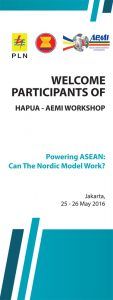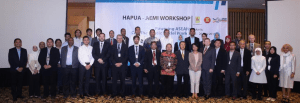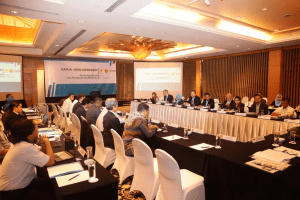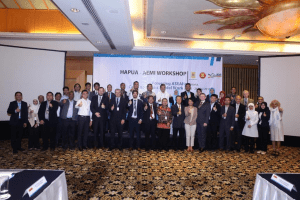Powering ASEAN: Can the Nordic model work?
AEMI-HAPUA Workshop24-26 May, 2016
Aryaduta Jakarta Hotel, Jakarta(held under the Chatham House Rule)
Objectives
The main theme adopted by the ASEAN Plan of Action for Energy Cooperation (2016-2025) is “Energy connectivity and market integration”, and the ASEAN Power Grid (APG) is a key component of this vision. Whilst a number of bilateral grid interconnections have been constructed, no electricity trade involving more than two countries has occurred. The success of the Southern African Power Pool in adapting the experience of the Nordic Power Pool to local conditions shows that a regional power exchange can be created between power industries that have not been liberalised. This raises the question of whether an ASEAN Electricity Exchange could be created following the same approach.
The HAPUA-AEMI Workshop was convened on 24-26 May 2016 to:
- provide participants with an overview of the Nordic electricity exchange Nord Pool and the Southern African Power Pool (SAPP); and
- examine whether similar approaches could be adapted to ASEAN and allow the APG to operate on a multilateral basis.
If the approach were deemed appropriate, participants would then:
- contribute to formulating the objectives and spelling out the terms of reference of a Feasibility Study for the creation of an ASEAN Electricity Exchange (AEE);
- agree a collaborative approach for delivering this Feasibility Study, whereby ASEAN officials would work seamlessly with a consortium of experts from Norway, the U.K. and South Africa.
Outcomes
The Workshop was attended by some 35 participants, including energy officials from the ASEAN Center for Energy, ASEAN Power Grid Consultative Committee, as well as academics from ASEAN institutions. Also present were experts from Nord Pool Consulting (Norway), Ricardo Energy & Environment (U.K.) and from the Embassy of Norway, Singapore. The ASEAN Secretariat participated as an observer.
Participants agreed unanimously that the creation of an ASEAN Electricity Exchange (AEE) would:
- allow utilities to sell power from excess capacity and purchase power to satisfy excess demand so as to balance the full operation of their national markets.
- create the possibility (and not the obligation) to share resources between countries where there is excess generation and those where there is a lack of sufficient generation.
- allow utilities to balance services on a more cost effective basis, by trading with other participating countries rather than through striving for self-provision, subject to the availability of sufficient APG transmission capacity between them.
Regarding next phases for considering the creation of an AEE, participants agreed unanimously to recommend three phases, each providing a clear decision point before proceeding further:
- Feasibility Phase (6 months), to deliver an AEE Feasibility Study;
- Design Phase, to identify and deliver preparatory tasks needed to create the multilateral market;
- Implementation Phase, to deliver an AEE, ready to operate.
Furthermore, they agreed that the core purpose of the AEE Feasibility Study is to allow ASEAN policy-makers to determine whether its creation would enable the APG to operate on multilateral basis by 2018, therefore allowing it to deliver the benefits it holds for ASEAN Member States (AMS). Participants therefore:
- adopted detailed terms of reference for such feasibility study;
- agreed that the study should be conducted in a collaborative approach, with an ASEAN core team working seamlessly with the consortium of experts.
Finally, participants recommended unanimously that HAPUA present the conclusions from this Workshop to HAPUA Member States, asking for their response, and to report to the next SOME on 12-15 July 2016 in Naypyidaw, Myanmar, that HAPUA will conduct the Feasibility Study for the creation of an ASEAN Electricity Exchange (AEE) to allow the APG to operate on a multilateral basis by 2018.
Forum papers
- Agenda

- Participants List
- Conclusions and Forum Statement
- Forum Proceedings
- Moving Forward with ASEAN Connectivity (Christopher Zamora)
- What is the Nordic Model (Mr. Hans Arild-Bredersen and Mr. Wilhelm Söderström)
- SAPP Regulatory Framework and Wheeling Methodology (Jonathan Hedgecock)
- ASEAN Power Market Integration for Electricity Supply Security (Mr. Syaiful Bahkri Ibrahim)
- Feasibility Study for AEE: An Outline (Dr. Nawal Kamel)
- Feasibility Study for the AEE: Approach, Process and Timetable (Dr. Philip Andrews-Speed)



